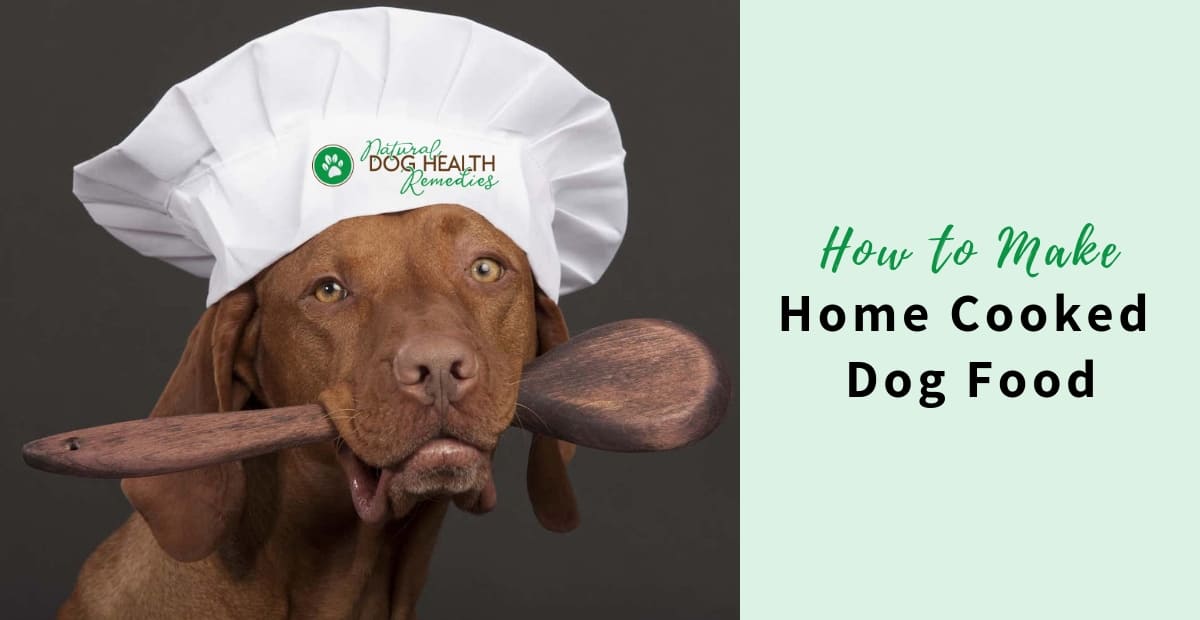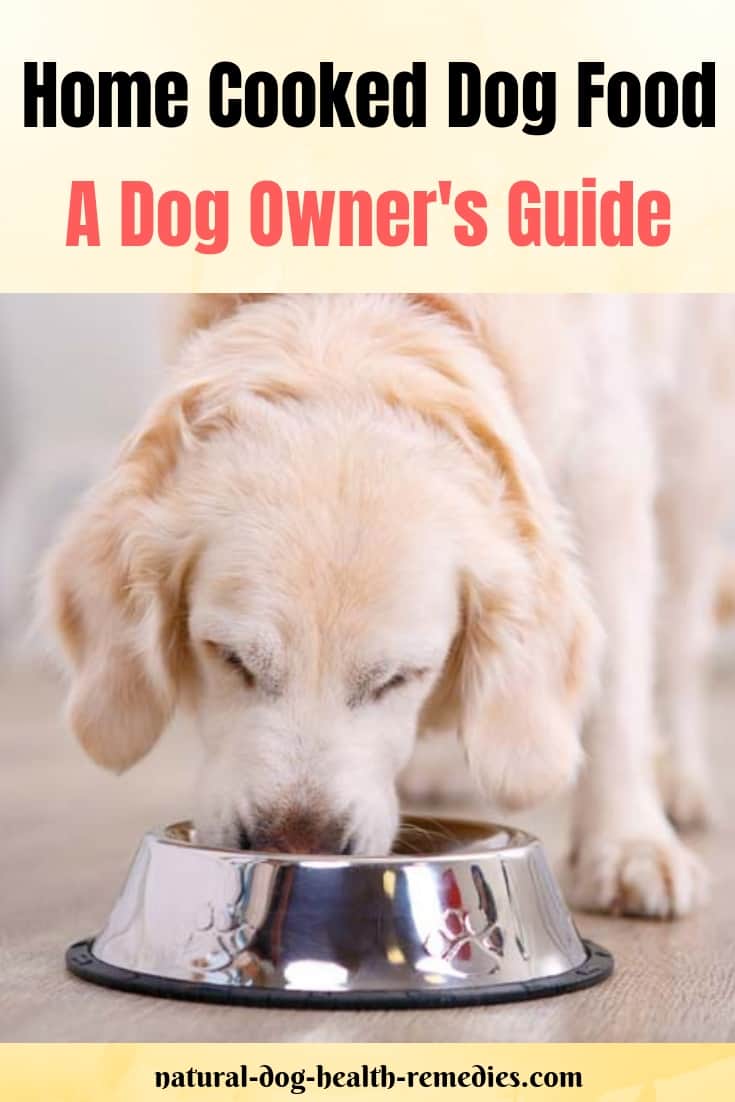Home Cooked Dog Food
(FTC Disclosure: If you make a purchase via a link on this page, I may receive a small commission, at no added cost to you.)

Overview
Do you cook for your dog? Many dog parents want to give their dogs more healthy and natural home cooked dog food but don't know where to start or what to include in the diet.
Feeding our dogs home prepared food (whether raw or cooked) has many advantages, but we need to be very careful with the balance of nutrients. Otherwise, our dogs may not get all the vitamins and minerals needed for growth and optimal health.
The article looks at the following topics:
- The Pros and Cons of Home Cooking for Your Dog
- Three Basic Rules to Remember
- Ingredients to Include in a Home Cooked Dog Diet
- How Much to Feed Your Dog
- Which Supplements are Needed to Balance a Home Cooked Dog Diet?
- Transition from Kibbles to Home Cooked Dog Food
- Good Recipe Books to Have
Pros and Cons of Home Cooking for Your Dog
Like anything else in life, there are pros and cons for home cooking for your dog. Let's take a look:
Pros
- Unlike processed dog foods (such as kibbles) which have lost a lot of their nutritional value during the course of processing, home made dog food is fresh and wholesome. It can provide nutrients in their more natural and complete form.
- You have more control over the ingredients to be included in the food, making it easier to avoid any foods to which your dog may be allergic.
It is also easier to adjust the diet as needed based on your dog's weight, lifestyle, activity level, health conditions, and other needs.
- Home cooked dog diets (particularly those with few or no grains) are higher in protein which supports the skin and the immune system and are easier for dogs to digest. This in turn can improve the health of the digestive system.
- Many dogs with health problems such as allergies, IBD, chronic ear infections, arthritis, etc. have seen their symptoms reduced or eliminated after they began eating a home cooked diet.
Cons
- Perhaps the most difficult part in making your own dog food is to design a diet that provides all the nutrients needed by your dog. It takes a lot of time and commitment and sometimes some dog parents may take shortcuts in the preparation, resulting in a poorly designed home cooked diet.
It is important to remember that while fresh, home cooked dog food is better than processed foods, a good commercial diet is better than a poorly designed homemade diet.
- Problems may also occur if the home cooked dog food is either under- or over-supplemented with certain vitamins and minerals. (The most common imbalances in home prepared dog food involve calcium, phosphorus, zinc, magnesium, and iron.)
- Getting high quality ingredients (especially organic ones) can be more costly.
Basic Rules to Follow When Making Your Own Dog Food
When cooking for your dog, bear in mind these three basic rules:
Variety
Home prepared dog food should include a variety of ingredients, not just one meat and grains.
It is best to feed many different types of meat (e.g. beef, pork, chicken, lamb, turkey, fish, etc.), as well as other foods such as organ meat (heart, liver, etc.), eggs, cottage cheese, and yogurt.
(Of course if your dog has food allergies, you can only feed those food items that your dog is not allergic to.)
By feeding your dog a wide variety of ingredients, your dog can, over time, get a more balanced diet with nutrients coming from different sources.
In addition, if you keep feeding your dog only one type of meat for a long time, your dog may start to develop allergy to that meat. Therefore, feeding your dog different types of meat and other ingredients can help prevent your dog from developing allergy to a certain of food.
Balance Over Time
When you feed a wide variety of different foods, there is no need to make each meal "complete and balanced". You just have to make sure that your dog gets everything he needs over a week or two, not at every meal.
Calcium
When making your own dog food, you MUST add calcium if the dog diet does not include bones.
Adult dogs need about 800 to 1000 mg of calcium per pound of food fed. Calcium must be supplied in a proper proportion to phosphorus. The ideal calcium:phosphorus ratio is between 1:1 and 2:1.
Meat contains a lot of phosphorus, so if your home cooked dog diet includes a lot of meat, you need to include more calcium to reach the correct calcium:phosphorus ratio.
Sources of calcium include ground eggshells and calcium supplements, such as calcium carbonate or calcium citrate.
Some people add raw bones to a home cooked dog diet to supply the calcium needed for the dog. If you include raw bones in your dog diet, then you do not have to add calcium to the diet.
NOTE: DO NOT feed cooked whole bones to dogs as they are brittle and prone to splintering, which can cause tooth fractures, intestinal obstruction and intestinal perforations.
Ingredients in Home Cooked Dog Food
Meat and other Protein Sources
Protein sources (e.g. meat, eggs, dairy products) should make up at least half of the diet, and preferably more.
Meat should include both muscle meat (such as lamb, beef, chicken, turkey, pork) as well as organ meats (e.g. kidney, liver, heart). Because organ meats are nutrient-dense, it is best to feed small amounts daily or every other day, rather than large amounts at one time.
You can also include canned fish, such as pink salmon, sardines, jack mackerel, once or twice a week.
Dairy products such as yogurt and cottage cheese offer good nutritional value. These should be added after the food is cooked.
Eggs can be soft-boiled, hard-boiled, gently scrambled, etc.
Grains
Since dogs are not biologically designed to eat and digest carbohydrate sources (such as grains), they should preferably not be included in the diet.
If you opt to include grains, they should not be over 25% of the diet.
Choose whole grains such as oatmeal, white rice, brown rice, barley, bulgur, millet, etc. Just as with other foods, feeding a variety of different grains and carbs is better than always feeding the same kind.
Vegetables and Fruits
Veggies are optional but small amounts are actually beneficial to our dogs.
Leafy greens are the healthiest veggies for dogs. Other good veggies include broccoli, cauliflower, brussels sprouts, cabbage, carrots, zucchini, and more. Steaming and blending is the best way to prepare vegetables for dogs.
Fruits can be added to the dog diet in small amounts. Good fruits to feed include apples, bananas, papayas, berries, and melon. DO NOT feed grapes or raisins for they are toxic to dogs.
How Much Home Cooked Food Should I Feed My Dog?
The amount of food needed by each dog is of course different, depending on various factors such as the dog's age, lifestyle, activity level, and metabolism, etc.
As a general rule, dogs will eat around 2-3% of their body weight in fresh food every day (use cooked weights for foods that are cooked).
Large dogs tend to eat a lower percentage while small dogs a higher percentage of their body weights. Toy breeds may need more - as much as 4-5% of their body weight daily. On the other hand, giant breeds might eat as little as 1.5%, or even less.
It is healthier for dogs to be lean, so if your dog is mostly sedentary, or tends to gain weight easily, you can feed leaner meats and low-fat dairy products.
Also, grains and starchy carbs can affect weight. Reducing the amount of grains can greatly help dogs who need to lose weight.
Supplements Needed
Home cooked dog food is more likely to need supplementation, since cooking destroys or reduces some nutrients. As mentioned above, if you do not add raw bones to the home cooked food, you need to supplement your dog with calcium.
In addition, you should strongly consider the following supplements:
- Fish Body Oil
The most important supplement is fish body oil, such as salmon oil. (Do NOT give liver oil since liver oil contribute too much vitamin D.)
Fish body oil supplies Omega-3 fatty acids which provide a lot of benefits to dogs and are hard to find in any diet, whether homemade or commercial.
The recommended dosage for healthy dogs is around 1,000 mg of fish oil per 20-30 pounds of body weight.
Whenever supplementing oils of any kind, you need to supplement with vitamin E, or the dog's body will become depleted of this vitamin over time.
- Digestive Enzymes and Probiotics
Digestive enzymes are especially helpful for dogs with gastrointestinal problems. Heat destroys digestive enzymes, so home cooked dog food is best supplemented with enzymes to help the dog digest and absorb the food.
Probiotics is beneficial especially if your dog is stressed or ill, has been treated with antibiotics, or has had diarrhea.
- Minerals
Minerals are most safely supplemented in whole food form. Green blends, such as Spark for Pets, that contain green foods like spirulina, chlorella, bladderwrack, etc. which are excellent sources of trace minerals.
Other trace mineral sources include organic apple cider vinegar, nutritional or brewer's yeast, and dark molasses.
Switching Over to Home Cooked Dog Food
 Most dogs have little problems switching over to a diet of home cooked dog food. If your dog is prone to digestive problems, you may want to make the switch gradually.
Most dogs have little problems switching over to a diet of home cooked dog food. If your dog is prone to digestive problems, you may want to make the switch gradually.
Add just one new ingredient at a time and wait a few days to see how your dog does before adding something else new, gradually decreasing the amount of old food and increasing the amount of new food.
If your dog vomits or has diarrhea, return to his prior diet and make the change more carefully once his digestive system is back to normal.
That may include feeding the new food separately from the old (at least a few hours in between meals), and feeding only one new food at a time, to see if your dog reacts to any of the new ingredients. Supplementing the diet with probiotics and digestive enzymes in this case may help significantly.
Homemade Dog Food Recipe Books
As mentioned above, home cooked dog food is healthy for your dog IF it is balanced and includes the numerous supplements beneficial to the dog.
It is not easy to figure out by ourselves whether a home cooked dog diet is balanced or not - that's where a good recipe book comes in.
Here are a couple of books recommended by the Whole Dog Journal (January and March 2011 editions) and are available at Amazon.com:
- Dr. Pitcairn's Complete Guide to Natural Health for Dogs & Cats by Richard H. Pitcairn and Susan Hubble Pitcairn
- Dr. Becker's Real Food for Healthy Dogs and Cats by Beth Taylor and Karen Shaw Becker
L. Olson, Raw and Natural Nutrition for Dogs: The Definitive Guide to Homemade Meals (North Atlantic Books, 2010).
W.J. Dodds, D.R. Laverdue, Canine Nutrigenomics - The New Science of Feeding Your Dog for Optimum Health (Dogwise Publishing, 2015).
M. Segal, K9 Kitchen: The Truth Behind the Hype (Transcontinental Printing, 2009).





